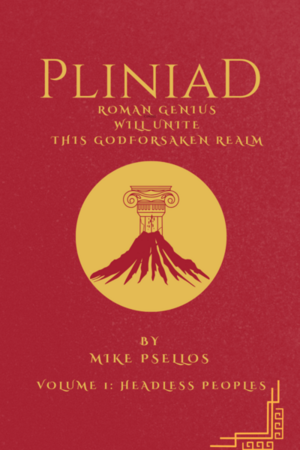Chapter 37:
Epilogue: Ius Divinum Fervens Porto
Pliniad: Roman Genius Will Unite This Godforsaken Realm
Two servants prepared a sacred broth in a pot, working methodically under the watchful eye of the Pythia priestess, a snake woman. Next to them, they delicately cut a large block into perfect cubes, wasting not a single ounce as it was placed on a ceramic board.
Though unheard, the Lamia priestess knew the silent prayers accompanying each action. She had performed this sacred offering a thousand times, but in recent weeks, the routine had shattered. The situation worsened, and her anxiety mounted with each performance. When things went wrong, they blamed her, assuming her offering was flawed. The toll manifested in her body: scales shed prematurely, and dark circles shadowed her eyes. Her tongue flicked back and forth as she watched them prepare the broth.
In an ornate gold and ceramic bowl, a single spoon of broth was poured, followed by exactly three cubes. The priests then retrieved a few dried kelp leaves from a cabinet. In the past, this cabinet had overflowed with abundance, but now it was only a quarter full. They took only a single sheet, a stark contrast to the two or three they would have taken previously.
The Lamia priestess protested, "Surely I can use three instead of one, to ensure it's working!"
The handmaidens shook their heads, explaining, "No, that's not necessary, and we can't afford it." They revealed strict orders for at least two offerings daily, having rationed enough for two weeks, after which they were unsure. There was a problem with the kelp trade. Jokingly, they suggested, "In addition to your other prayers, be sure to ask for more kelp."
In the past, she might have laughed or rolled her eyes, but now she gulped, finding the request almost too much to bear.
The official broke the single sheet of seaweed in half and meticulously cut the tiniest slivers, placing them in the sacred broth. While still hot, it was handed to the Lamia, who, wearing sacred gloves and mittens, accepted it with a bow and walked towards the courtyard. Historically, the excess offerings to the priests had provided their nutrients and food. The Lamian priestess had never particularly liked the earthy flavor of the sacred broth, preferring high-protein foods more fitting for a Lamian. However, given the temple's dire circumstances, she was nearly salivating at the bowl, using her discipline not to partake. Normally, a fast would precede such an offering, but the temple's conditions had already enforced one, and she hadn't eaten for a day. She was desperate for any good omen; if one appeared, she would receive an additional egg with her meal today, and she craved it.
As she walked into the courtyard, her mother stopped her, reminding her of the offering's importance, a reminder she didn't need. The Lamian priestess smiled and nodded, admitting she knew, not wishing to start a fight. Internally, she wanted to scream, having heard these platitudes countless times. She was tired of the repeated warnings: "It's important," "an ominous threat is coming," "other cities have reported dark omens," and so on. It was her job to hear these things, and they usually happened, though not as frequently as now. Even mundane occurrences were now interpreted as omens. Civil unrest was a bad omen, and the drying up of the kelp trade was seen as divine disfavor, even though kelp was the gods' favorite food. Some wondered if the gods no longer wished for their offerings, caught in a "death spiral of thought."
While listening to her mother prattle, she froze when she heard that the ambassador of the foreign city to the northeast would attend the service. To worsen matters, her partner, Cilia, would be absent. She would be alone. Lamia looked to her mother, asking if she could help. Her mother informed her that, as a married woman of age, she was no longer permitted to participate in offerings. Having passed her fifth molting, she had transitioned to a senior role, a rule established by her mother years ago. Her mother assured her that if she did everything right, there would be no problems. Lamia quickly agreed and nodded, her eyes fixed on the sacred broth, watching its meniscus rise and fall, careful never to let it reach a certain point. She kept her mind focused on an invisible line at the bowl's rim as her mother talked, reprimanding her.
She slithered along the cobblestone streets, approaching the Temple main building from the outer courtyard. The temple was a large, square tower building with curved arches on every side, contrasting sharply with the rest of the city. The city itself was a fusion of human cross-bar architecture and ancient Lamian sandstone designs, a style called "Lamian Revival," a term from centuries ago when it was thought the Lamian people were reviving, not merely "puttering on" as they seemed to be now. The only unifying element among these disparate buildings was their red tile roofs, made from the red, rusty, and poor-for-farming clay nearby. While excellent for bricks, tiles, and pottery, the soil was terrible. With the kelp trade's collapse came the drying up of other food sources. The city struggled to make ends meet, and the priests were forced to fast, if not by order, then by circumstance. She was very hungry. She looked at the soup again, then looked up to avoid feeling too bad.
The temple doors were opened by attendants, and she slithered silently through the stone steps. Before entering the door, she turned to the crowd, seeing her mother take her place next to the ambassador and the city mayor. She saw the large crowd of hungry faces, hungry eyes, clutching their small idols purchased from the church. Sacred waters and incense burned, wafting a light, aromatic smell through the temple. The Lamia startled, then was shocked by her own startling. She panicked for a moment, looked down, and saw not a drop of soup had spilled. She offered a prayer of thanksgiving, then, as loudly as her cracked, parched voice could manage, she said:
"Like my ancestors before me, I go to our great consort, and I come with his offering and gifts."
She had said it a thousand times before, not meaning it then, and unsure if she meant it now, but almost wishing she did. The crowd repeated the priesthood's refrain, and within the crowd, they repeated their parts:
"May he find you favorable.
May he accept with a warm smile and an open hand,
may he pat your head with grace,
may he compliment your work"
The priestess turned into the temple. Two attendants followed her, one steadying the mayor in the back as the doors closed. Within moments, she would complete her offering, say her prayers, and the smoke would rise. Should the gods bless her, she would receive a vision. If she emerged within ten minutes with an empty bowl, she would report having seen nothing, as she had so often. The priestess walked through the halls of red pillars and paper doors within the stone tile. A small red carpet led her to the altar of her God. Even from a distance, illuminated by iron torches, lamps, and paper lanterns floating above, she saw the icon: a heart made of two Lamias. In the middle was a man with a crown, the hero, the great founder of their people, and his two beloved consorts, Yessi, the ancient Lamian consort of the High God, and Betsy, the once great human warrior, Lady of dark magic. Lamian resumed her steps. A part of her wanted to rush, dump the miso, and just get it over with, say nothing, and be done. But she had been too well-trained for that. She slithered, she danced, performing her ritual, slowly going side to side, as she had been taught. She counted the tiles: one from the edge of the carpet, stop, twirl, slither again; one from the edge of the carpet, stop, swerve, slither again. As she walked in a pattern seen by no one except her and possibly her gods, though it was hard to tell these days, she continued her ritual dance. She offered the prayers expected of her:
"Oh, great hero, slayer of Demons, I bring the salt, I bring the soy of the curd, I bring the fermented, I bring the water, I bring the kelp. Please take this and find it acceptable to you in the manner I have prepared it, in the manner you have prescribed. I have adorned and garnished it with our love, with our hope, with our passions. I give it to you freely, and I give it to you with love, that you may accept it and tell us that you are ours again."
She repeated this again and again as she slithered through. But as she reached the middle of the temple, she suddenly heard a loud thud. Startled, she looked around. The fires were going out all around her. The city outside seemed brighter than the semi-darkness inside the temple. She heard a voice, old, raspy, but firm, speaking in a language she had never heard before. It said:
“Haec fructus videte Ex Urbe Carthagis sunt.”
She hears a crowd shouting; they are howling with building rage. She gasped. She dropped the bowl, and it shattered.
By the gods, no!
But out of the bowl came not soup, but fruit: pomegranates, apples, citrus. Shocked, she stared at the fruit.
The voice continued from behind her, in Latin, unbeknownst to her:
"Videte musti sua. Sic Milles Carthagis erunt.”
The crowd murmured and whispered amongst themselves, a crowd she could not see, but the voice continued to speak behind her.
“Veto”
“Calumnia”
“Nihil”
“Pugnabimus!”
She turned and saw the man. He was an older man, clean-shaven, covered in wrinkles. His face was long and angular, with a nose hooked like an eagle's beak. His eyes were sunken in with wrinkles and stress. He was a man both impossibly ugly yet incredibly revering. He wore strange white and purple robes, standing upright, one hand to his chest, the other waving around. The man shouted with a voice that belonged to a man twenty years his junior:
"Igitur Carthago delanda est!"
The crowd of men in white robes stood up and roared.
Goddess, Who are these men?
She heard a rod crash against the stone floor. In front of her, a new face appeared: a wise and old man with a wild beard, similar robes, a similar fire behind his eyes, a throng of older and younger men shouting. The rod struck again.
“Oh, great hero, slayer of Demons, I ask now for thy protection against…”
"Tacete!
Tacete!"
he said again.
Where am I?
The crash was heard again. The man shouted again, "Carthago delenda est!" - "Carthago delanda est!" in Latin. He said it again, "Carthago delanda est!" A loud crash of the stick.
"Tacete, Cato!
“ordinem habebimus! ordinem habebimus!”
Sweet, goddess, help me understand, why am I seeing this?
"Tacete!"
The crowd roared. The man called Cato continued to shout, and the crowd behind him cheered, joining him in unison, a single voice: "Carthago delanda est!
Carthago delanda est!"
The man across from him continued to strike his staff, now as if in a chant, each playing off the other.
Is this because I spilled the broth? I will get another; forgive me!
He struck it again. "Tacete!"
The ground shook, she stumbled onto the carpet. She could see the sandals of their feet. Pillars emerged. As she looked around in horror, strange white pillars shot out from the floor below her. She gasped as they pierced the temple, ripping off the roof.
What’s happening?
The roof toppled. She was now in an open field or an open town. She could see the red tiles of the buildings around her. The tiles began to shimmer and move. All the while, the sounds continued to be heard: "Carthago delanda est!
The carpet she was lying on broke apart and slithered away. She gasped and jumped back onto her tail, and coiled herself. The red carpets abandoned the floor, slithered up the Pillars like vines and hung themselves from the roofs. Each red banner now showed different animals: Lions, Eagles, Bears all gold all had the same four sigils below it.
Why are you showing me this!
“Carthago delanda est!”
“Tacete! ordinem habebimus!
Tacete!"
The tiles shimmered. The tiles quaked. Suddenly, the tiles started getting up. There were men holding them like shields, marching. They were marching towards her. The roofs were giving up their tiles, and they were marching towards the temple. They were surrounding the temple. More pillars emerged. The voices continued: "Carthago delanda est!
Carthago delanda est!
Tacete, Tacete!
Carthago delanda est, Tacete!"
She screamed again.
What did we do wrong? Why are you so angry with us, please!
As she watched the men get closer, their shields became visible. They wore strange metal armor and were wet. They pulled out their smaller swords. She had never seen this type of sword before, too large to be a dagger, too small to be an adventurer's blade. They crashed their swords against their shields in unison, in time with the staff, and in time with the shouting.
My divine Lords I beg you, please! Make me understand!
Pom Pom Pom Pom
"Carthago delanda est!”
Tacete!
ordinem habebimus!"
Pom Pom Pom Pom
All the while, it grew louder and louder. She coiled herself and jumped using her arms to help her move faster as she dared to approach the altar. She had no choice.
I throw myself at your feet. Tell Me! Please!
She looked to her idol for guidance, for protection, and she saw cracks. The stone panel and mural were breaking.
What do we do!
It fell apart. It shattered.
My Lord! My Lord!
She Looked up! She was in a different room, and then, in the ruins of what remained of her old gods, stood an iron one: a wolf suckling two children. She screamed a primal scream as her consciousness left her body. They came in to see her. She was lying perfectly straight on the floor, as if impaled with a staff. Her eyes stared out. Her face pale with veins bulging around her. Her face clenched as she kept her jaw shut. Hands pulling at her hair.
“She is poisoning herself!”
“Get her a relaxant”
“Get a medicus”
“What happened”
“The Gods punished her”
“Tell us what you saw”
“What have you done?”
The priestesses try to help her, she is writhing to fight them. She will not speak. She cannot.
“Speak! What happened”
She was holding in a prophecy that she was fighting to be free. She prayed silently as she begged for the poison to work faster. She spoke with two voices, the wail of a child and the shout of an old woman:
"Tacissii delanda est!" She cried.




Please sign in to leave a comment.